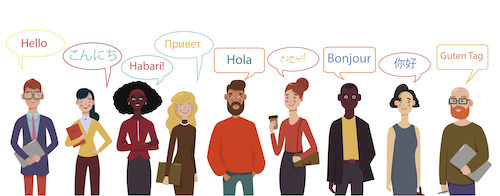Ever wanted to learn English as a second language? There are many job and career benefits to speaking English proficiently in addition to your native language.
Only about 20% of people in the US speak a second language fluently. So by learning English, you automatically put yourself ahead of the 80% of people in the US who don’t speak a second language.
No matter your native language, you can learn English with ESL classes. Or, if you already know some English but want to improve your reading, writing, and speaking skills, you can also join a class to increase your English language proficiency.
However, learning another language requires time, dedication, and practice. So, sign up for one of our English as a Second Language (ESL) Classes in Tennessee.
Does being bilingual or multilingual help your career?
More than ever, employers seek people who can bridge the gap between cultures and speak both languages. One study on US economic development claims that American businesses lose more than $2 billion yearly due to language or cultural misunderstandings. In addition, businesses become more global by the day, so making meaningful connections and reaching more clients and partners across the globe is something they need to succeed.
One columnist and CMO recounted when he had a cold call with a company CFO. He was about to lose the call when he picked up on a Spanish accent; then, he switched the conversation from English to Spanish. By the end of the phone call, he had gained his business a new loyal customer.
If you’re bilingual, you will help businesses achieve their goal of expanding and gaining more competitive clients. Common in-demand languages include Spanish, Chinese (Mandarin), French, and Japanese. A native speaker of any of these languages has a leg up in the professional world.
Business owners and employers realize that customers prefer it when you speak in their native language to them. If companies can speak their language, those customers are more likely to stay loyal to the company. Furthermore, jobs like social workers and HR can reach someone’s heart quicker if they can speak their native language, which aids in building trust with clients that is essential to the success of those careers.
- 9 out of 10 employers rely on bilingual and multilingual employees
- 85% of employers rely on the Spanish language, while 42% experience a shortage of workers who speak the language
- Other sought-after languages include Chinese, French, and Japanese
Bilingual employees are also essential in roles that require negotiation and conflict resolution, as they can communicate effectively with parties from different cultural backgrounds, facilitating smoother and more successful interactions.
Do jobs ever pay more if you are bilingual?
Yes! People who speak more than one language earn 5% to 20% more on average than those who don’t. Because bilingual skills are in high demand, but not many have them, employers offer higher salaries to compete with other companies seeking the same bilingual employees.
In addition to higher base salaries, bilingual employees may also receive bonuses for their language skills, especially if their role involves frequent translation or communication with non-English-speaking clients.
When interviewing with multiple businesses, job seekers with the ability to speak more than one language can negotiate higher salaries and take the highest offer. As a result, people who speak multiple languages often receive more pay.
Will you get better jobs if you know many languages?
When applying for jobs, you must have as many skills as possible on your resume that make you stand out. Speaking more than one language automatically tells potential employers you have in-demand skills that few people have.
Why do businesses want bilingual employees? Companies with customers who prefer to speak in another language other than English rely on employees who can speak with them. In addition, healthcare centers, hospitals, and state and local governments must have bilingual or multilingual employees to meet regulation standards.
Just look at the numbers: bilingual remote jobs have increased by 30% since 2020. Plus, between 2010 to 2015, the demand for bilingual jobs more than doubled from 240,000 listings to 630,000 listings.
Bilingual employees are often preferred for roles that involve travel, international assignments, or relocation, as their language skills allow them to integrate more smoothly into different cultures and environments.

Career Options for Bilingual Speakers
Over the next decade, businesses expect the need for bilingual employees to increase steadily. Jobs like translation and interpretation may grow by over 9,000 new positions annually until 2031. Translators and interpreters aren’t the only jobs steadily increasing for those who can speak more than one language. Below are more career opportunities for polyglots.
- Translation and Interpretation
- Education
- Tour guide
- Journalism
- Construction
- Criminal justice
- Social Workers
- Sales
- Marketing
- Customer Service
- Management and HR
- IT
- National security
- Healthcare and Emergency Services
Many of those jobs listed rely on accurate information being passed from one person to another. However, many people in the United States and abroad can’t effectively communicate in more than one language. If you can speak multiple languages with proficiency or fluency, you will allow more people to express their concerns, emotions, and knowledge accurately.
Other Advantages of Learning English as a Second Language
In addition to better job opportunities, learning a second language benefits your brain! Those who speak more than one language can switch between tasks more quickly than those who only speak one. So, not only does the skill of speaking a second language help your career, but it gives you additional skills that help you thrive in a corporate environment.
Furthermore, the ability to switch between languages gives you the edge in processing information faster and more efficiently, giving you outstanding problem-solving and quick decision-making skills. Employers love to see these problem-solving and fast-thinking skills. In addition, some studies suggest these enhanced cognitive skills protect against dementia and other degenerative brain diseases.
When you learn another language, you also learn about the culture attached to the language. So, bilingual and multilingual speakers empathize with multiple cultures and understand cultural nuances better than those who only speak one language. In addition, learning a language and culture helps close any gap in communication between people from different places. Not only does closing a cultural gap help in the workplace, but it also helps in social situations.
For instance, bilingual individuals often find it easier to navigate travel and international assignments, as they can communicate with local populations more effectively.
What more reason do you need to have a bilingual education?
Bilingual and Polyglot Job Skills
Once you learn to speak, read, and write in English, you should update your resume to showcase your high-in-demand skills! Not only can you list your native language and English as languages you speak, but you can include other skills you learned while studying ESL. List skills, like problem-solving expertise, the ability to sympathize with others and understand diverse perspectives, creativity, and resourcefulness.
The interpersonal skills developed through bilingualism—such as active listening and empathy—are highly valued in leadership and customer-facing roles.
How to Learn English as a Second Language
A better and higher-paying career is right at your fingertips. Call us at Workforce Essentials for English as a Second Language classes and job-seeking services. Our experienced ESL teachers can help you learn English and further your career and earning potential. Our experienced ESL teachers can help you learn English and further your career and earning potential. We offer a structured curriculum that covers essential language skills such as reading, writing, speaking, and listening, and also incorporate cultural education to help you understand and navigate the nuances of English-speaking environments.
Learning a language is also about understanding the culture. Our ESL program includes cultural immersion activities such as field trips, social gatherings, and guest speakers, helping you experience American culture firsthand and practice your English in real-life situations. Even after you complete our ESL program, we continue to support your language learning journey with advanced courses, conversation clubs, and alumni events. Join our ESL classes at Workforce Essentials and take the first step towards a brighter future. With our comprehensive and supportive learning environment, you’ll gain the confidence and skills you need to succeed in your career and everyday life.




